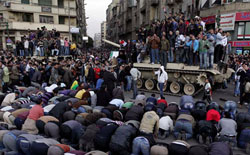| NSPM in English | |||
The Egypt Crisis in a Global Context |
 |
 |
 |
| понедељак, 31. јануар 2011. | |
|
(Stratfor, January 30, 2011)
It is not at all clear what will happen in the Egyptian revolution. It is not a surprise that this is happening. Hosni Mubarak has been president for more than a quarter of a century, ever since the assassination of Anwar Sadat. He is old and has been ill. No one expected him to live much longer, and his apparent plan, which was that he would be replaced by his son Gamal, was not going to happen even though it was a possibility a year ago. There was no one, save his closest business associates, who wanted to see Mubarak’s succession plans happen. As his father weakened, Gamal’s succession became even less likely. Mubarak’s failure to design a credible succession plan guaranteed instability on his death. Since everyone knew that there would be instability on his death, there were obviously those who saw little advantage to acting before he died. Who these people were and what they wanted is the issue. Let’s begin by considering the regime. In 1952, Col. Gamal Abdel Nasser staged a military coup that displaced the Egyptian monarchy, civilian officers in the military, and British influence in Egypt. Nasser created a government based on military power as the major stabilizing and progressive force in Egypt. His revolution was secular and socialist. In short, it was a statist regime dominated by the military. On Nasser’s death, Anwar Sadat replaced him. On Sadat’s assassination, Hosni Mubarak replaced him. Both of these men came from the military as Nasser did. However their foreign policy might have differed from Nasser’s, the regime remained intact.
The demands for Mubarak’s resignation come from many quarters, including from members of the regime — particularly the military — who regard Mubarak’s unwillingness to permit them to dictate the succession as endangering the regime. For some of them, the demonstrations represent both a threat and opportunity. Obviously, the demonstrations might get out of hand and destroy the regime. On the other hand, the demonstrations might be enough to force Mubarak to resign, allow a replacement — for example, Omar Suleiman, the head of intelligence who Mubarak recently appointed vice president — and thereby save the regime. This is not to say that they fomented the demonstrations, but some must have seen the demonstrations as an opportunity. This is particularly the case in the sense that the demonstrators are deeply divided among themselves and thus far do not appear to have been able to generate the type of mass movement that toppled the Shah of Iran’s regime in 1979. More important, the demonstrators are clearly united in opposing Mubarak as an individual, and to a large extent united in opposing the regime. Beyond that, there is a deep divide in the opposition. Western media has read the uprising as a demand for Western-style liberal democracy. Many certainly are demanding that. What is not clear is that this is moving Egypt’s peasants, workers and merchant class to rise en masse. Their interests have far more to do with the state of the Egyptian economy than with the principles of liberal democracy. As in Iran in 2009, the democratic revolution, if focused on democrats, cannot triumph unless it generates broader support. The other element in this uprising is the Muslim Brotherhood. The consensus of most observers is that the Muslim Brotherhood at this point is no longer a radical movement and is too weak to influence the revolution. This may be possible, but it is not obvious. The Muslim Brotherhood has many strands, many of which have been quiet under Mubarak’s repression. It is not clear who will emerge if Mubarak falls. It is certainly not clear that they are weaker than the democratic demonstrators. It is a mistake to confuse the Muslim Brotherhood’s caution with weakness. Another way to look at them is that they have bided their time and toned down their real views, waiting for the kind of moment provided by Mubarak’s succession. I would suspect that the Muslim Brotherhood has more potential influence among the Egyptian masses than the Western-oriented demonstrators or Mohamed ElBaradei, the former head of the International Atomic Energy Agency, who is emerging as their leader. There is, of course, the usual discussion of what U.S. President Barack Obama’s view is, or what the Europeans think, or what the Iranians are up to. All of them undoubtedly have thoughts and even plans. In my view, trying to shape the political dynamics of a country like Egypt from Iran or the United States is futile, and believing that what is happening in Egypt is the result of their conspiracies is nonsense. A lot of people care what is happening there, and a lot of people are saying all sorts of things and even spending money on spies and Twitter. Egypt’s regime can be influenced in this way, but a revolution really doesn’t depend on what the European Union or Tehran says. There are four outcomes possible. First, the regime might survive. Mubarak might stabilize the situation, or more likely, another senior military official would replace him after a decent interval. Another possibility under the scenario of the regime’s survival is that there may be a coup of the colonels, as we discussed yesterday. A second possibility is that the demonstrators might force elections in which ElBaradei or someone like him could be elected and Egypt might overthrow the statist model built by Nasser and proceed on the path of democracy. The third possibility is that the demonstrators force elections, which the Muslim Brotherhood could win and move forward with an Islamist-oriented agenda. The fourth possibility is that Egypt will sink into political chaos. The most likely path to this would be elections that result in political gridlock in which a viable candidate cannot be elected. If I were forced to choose, I would bet on the regime stabilizing itself and Mubarak leaving because of the relative weakness and division of the demonstrators. But that’s a guess and not a forecast. Geopolitical Significance Whatever happens matters a great deal to Egyptians. But only some of these outcomes are significant to the world. Among radical Islamists, the prospect of a radicalized Egypt represents a new lease on life. For Iran, such an outcome would be less pleasing. Iran is now the emerging center of radical Islamism; it would not welcome competition from Egypt, though it may be content with an Islamist Egypt that acts as an Iranian ally (something that would not be easy to ensure). For the United States, an Islamist Egypt would be a strategic catastrophe. Egypt is the center of gravity in the Arab world. This would not only change the dynamic of the Arab world, it would reverse U.S. strategy since the end of the 1973 Arab-Israeli war. Sadat’s decision to reverse his alliance with the Soviets and form an alliance with the United States undermined the Soviet position in the Mediterranean and in the Arab world and strengthened the United States immeasurably. The support of Egyptian intelligence after 9/11 was critical in blocking and undermining al Qaeda. Were Egypt to stop that cooperation or become hostile, the U.S. strategy would be severely undermined. The great loser would be Israel. Israel’s national security has rested on its treaty with Egypt, signed by Menachem Begin with much criticism by the Israeli right. The demilitarization of the Sinai Peninsula not only protected Israel’s southern front, it meant that the survival of Israel was no longer at stake. Israel fought three wars (1948, 1967 and 1973) where its very existence was at issue. The threat was always from Egypt, and without Egypt in the mix, no coalition of powers could threaten Israel (excluding the now-distant possibility of Iranian nuclear weapons). In all of the wars Israel fought after its treaty with Egypt (the 1982 and 2006 wars in Lebanon) Israeli interests, but not survival, were at stake. If Egypt were to abrogate the Camp David Accords and over time reconstruct its military into an effective force, the existential threat to Israel that existed before the treaty was signed would re-emerge. This would not happen quickly, but Israel would have to deal with two realities. The first is that the Israeli military is not nearly large enough or strong enough to occupy and control Egypt. The second is that the development of Egypt’s military would impose substantial costs on Israel and limit its room for maneuver. There is thus a scenario that would potentially strengthen the radical Islamists while putting the United States, Israel, and potentially even Iran at a disadvantage, all for different reasons. That scenario emerges only if two things happen. First, the Muslim Brotherhood must become a dominant political force in Egypt. Second, they must turn out to be more radical than most observers currently believe they are — or they must, with power, evolve into something more radical. If the advocates for democracy win, and if they elect someone like ElBaradei, it is unlikely that this scenario would take place. The pro-Western democratic faction is primarily concerned with domestic issues, are themselves secular and would not want to return to the wartime state prior to Camp David, because that would simply strengthen the military. If they win power, the geopolitical arrangements would remain unchanged. Similarly, the geopolitical arrangements would remain in place if the military regime retained power — save for one scenario. If it was decided that the regime’s unpopularity could be mitigated by assuming a more anti-Western and anti-Israeli policy — in other words, if the regime decided to play the Islamist card, the situation could evolve as a Muslim Brotherhood government would. Indeed, as hard as it is to imagine, there could be an alliance with the Muslim Brotherhood designed to stabilize the regime. Stranger things have happened. When we look at the political dynamic of Egypt, and try to imagine its connection to the international system, we can see that there are several scenarios under which certain political outcomes would have profound effects on the way the world works. That should not be surprising. When Egypt was a pro-Soviet Nasserite state, the world was a very different place than it had been before Nasser. When Sadat changed his foreign policy the world changed with it. If the Sadat foreign policy changes, the world changes again. Egypt is one of those countries whose internal politics matter to more than its own citizens. Most of the outcomes I envision leave Egypt pretty much where it is. But not all. The situation is, as they say, in doubt, and the outcome is not trivial. |
Остали чланци у рубрици
- Playing With Fire in Ukraine
- Kosovo as a res extra commercium and the alchemy of colonization
- The Balkans XX years after NATO aggression: the case of the Republic of Srpska – past, present and future
- Из архиве - Remarks Before the Foreign Affairs Committee of the European Parliament
- Dysfunction in the Balkans - Can the Post-Yugoslav Settlement Survive?
- Serbia’s latest would-be savior is a modernizer, a strongman - or both
- Why the Ukraine Crisis Is the West’s Fault
- The Ghosts of World War I Circle over Ukraine
- Nato's action plan in Ukraine is right out of Dr Strangelove
- Why Yanukovych Said No to Europe

.jpg)









 Mubarak’s Opponents
Mubarak’s Opponents











